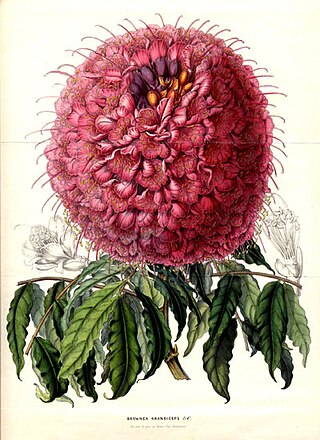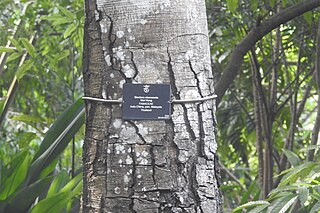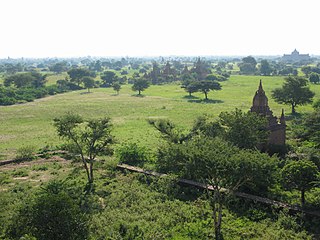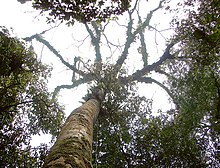
The subfamily Detarioideae is one of the subdivisions of the plant family Fabaceae (legumes). This subfamily includes many tropical trees, some of which are used for timber or have ecological importance. The subfamily consists of 84 genera, most of which are native to Africa and Asia. Pride of Burma and tamarind are two of the most notable species in Detarioideae. It has the following clade-based definition:
The most inclusive crown clade containing Goniorrhachis marginataTaub. and Aphanocalyx cynometroidesOliv., but not Cercis canadensisL., Duparquetia orchidaceaBaill., or Bobgunnia fistuloides(Harms) J. H. Kirkbr. & Wiersema.
The worshipping house for Nguyễn Khuyến is situated in Vị Hà hamlet, Trung Lương village, previously Yên Đổ, Bình Lục district, Hà Nam province in Vietnam.
Sindora beccariana is a species of plant in the family Fabaceae. It is a tree found in Borneo. It is threatened by habitat loss.
Sindora inermis is a species of plant in the family Fabaceae. It is a tree found in Sumatra and the Philippines. It is threatened by habitat loss.
Sindora javanica is a species of plant in the family Fabaceae. It is a tree endemic to Java in Indonesia.

Sindora siamensis is a species of tree in the subfamily Detarioideae of the family Fabaceae. It has an accepted infraspecific, the variety S. siamensis var. maritima (Pierre) K.Larsen & S.S.Larsen. See taxon box to the right below, and below for details on the variety maritima. The nominate species is found in many countries in tropical Asia. Like several other species in the genus Sindora, its wood is considered valuable; the least concern conservation status may reflect efforts to replant this species, but mortality rates are high. As well as the wood, the plant provides raw material for chemical products, food and drink, and domestic utensils.

Sindora supa is a species of plant in the family Fabaceae. It is endemic to the Philippines. It is threatened by habitat loss.
Sindora tonkinensis is a species of legume in the family Fabaceae. This up to 15 m (49 ft) tall tree is native to Cambodia and Vietnam, and it is cultivated in Guangdong in southern China.
Kulim (Malaysia) Berhad is a Malaysian company. Through its subsidiaries, it engages in oil palm plantation, investment holding, and property investment businesses in Malaysia. The company also manufactures rubber-based products, oleochemicals, and esters; produces oil palm clones by plant tissue culture technology; and distributes tropical fruits, as well as engaging in crude palm oil processing. The Corporate Office of Kulim (Malaysia) Berhad is located at Johor, Malaysia.

The Irrawaddy dry forests is a tropical dry broadleaf forest ecoregion in central Myanmar. The ecoregion occupies portions of the Irrawaddy, Sittaung, and Salween river basins, in areas with less than 800 mm of annual rainfall.
S. tonkinensis may refer to:
Sindora glabra is a tree of the family Fabaceae endemic to the People's Republic of China that grows in the provinces of Hainan, Fujian, Guangdong and Yunnan. The species is under second-class national protection in China.
The Macaque Cave is a karst cave located on the Macaque Ridge (猕猴岭) outside Dongfang City, Hainan, People's Republic of China.
Cladobrostis melitricha is a moth of the family Agonoxenidae. It is found in India. It's the sole species in its genus. One of its food sources is Sindora siamensis.

Tat Ton National Park is a national park in Chaiyaphum Province, Thailand. The park is in the Laen Kha mountain range. It features waterfalls and mountain highland scenery. On 31 December 1980, Tat Ton was designated Thailand's 23rd national park.

Tham Pla–Namtok Pha Suea National Park is a national park in Mae Hong Son Province, Thailand. It is home to caves, waterfalls and steep mountain terrain. It was established as a national park on 23 December 2010.
Na Yung–Nam Som National Park is a national park in Nam Som District, Udon Thani Province, Thailand.

Xylosandrus crassiusculus, known generally as the Asian ambrosia beetle or granulate ambrosia beetle, is a species of tropical bark beetle in the family Curculionidae. It is native to Asia and has spread to Africa, Europe, Australasia and the Americas. The adult beetle is reddish-brown and some 2 to 3 mm long.







